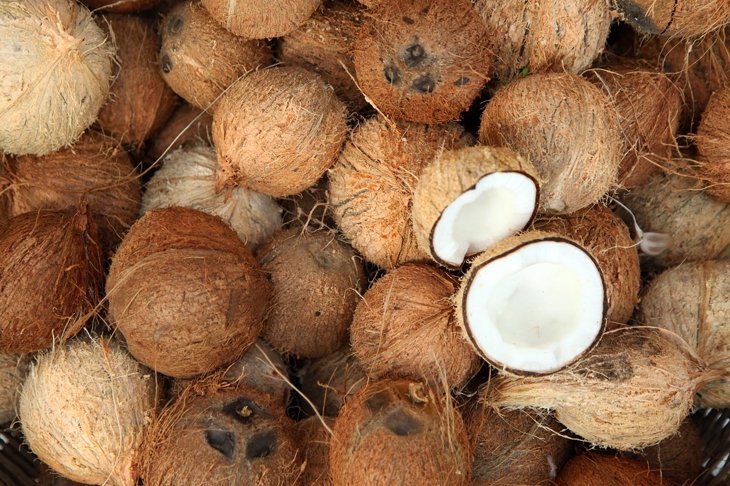
Coconuts offer a wealth of healthy products for us, including coconut oil, coconut milk, and coconut water, which all have some surprising uses and benefits.
There are few foods that embody tropical goodness more than the coconut, but that doesn’t mean it has to be limited to blended poolside beverages. This unassuming palm can nourish our bodies with its flavourful milk, heart-healthy oil, and electrolyte-boosting water, no matter what the season.

01
Crazy for coconut
Often referred to as the “Tree of Life,” coconuts have long been the obsession of many. Coconut palms have been featured in Indian writings that are more than 2,000 years old, and it is thought that over 30 percent of the world’s population depends on some form of coconut both for their economy and for food.
Coconut has been traditionally used around the world as medicine to treat everything from abscesses to asthma, and modern science is now also beginning to prove this palm fruit’s power. Broken down into all of its wonderful parts, the coconut has many health benefits that can be taken advantage of year-round.
02
The facts on coconut oil
 The great debate
The great debate
Early nutritional studies condemned the use of coconut oil, accusing its saturated fatty acids of causing high cholesterol and heart disease. But a wealth of new research has emerged to show that the medium-chain saturated fats in virgin coconut oil may not be the villains they were framed to be.
Unlike unhealthy long-chain fatty acids, medium-chain saturated fats are easily absorbed into the liver and may even play a role in preventing the accumulation of unwanted body fat. In one study, obese women who supplemented with virgin coconut oil saw a greater reduction in abdominal fat than those given soybean oil when also following a regimen of controlled diet and exercise.
Other benefits
Along with our waistlines, there may be good news for our hearts if the results of animal studies are replicated in humans. A study with rats found that coconut oil, in combination with exercise, provided health benefits to those with cardiovascular disease.
Further studies show that rats that were fed virgin coconut oil, as opposed to other palm oils, had lower blood pressure and improved circulatory cell function. Other research suggests that consuming coconut oil in moderation can reduce inflammation and even lower cholesterol levels.
With antioxidant properties stronger than those of olive and sunflower oil, virgin coconut oil can help to rid our bodies of damaging free radicals. And if you need yet another reason to love this laudable oil, studies with estrogen-deficient rats showed that supplementing with virgin coconut oil was even effective in supporting bone structure and preventing bone loss.
03
Should you try coconut water?
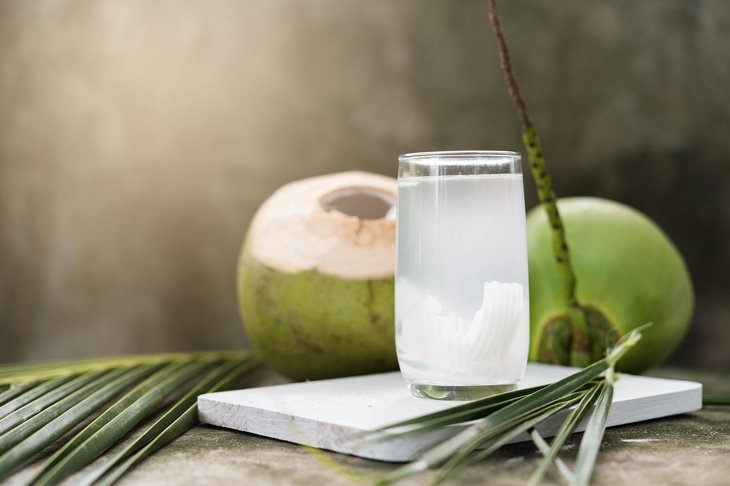 Next time you’re at the gym, swap out a sugar-laden sports drink for the natural refreshment offered by coconut water. Its mild, pleasing taste and soothing effect make it a great option for keeping dehydration at bay and avoiding tummy troubles.
Next time you’re at the gym, swap out a sugar-laden sports drink for the natural refreshment offered by coconut water. Its mild, pleasing taste and soothing effect make it a great option for keeping dehydration at bay and avoiding tummy troubles.
Studies have found that coconut water is just as effective at restoring total-body rehydration after a moderate workout as both plain water and commercial sport drinks, but is better tolerated by the digestive system. Keep in mind that athletes participating in very intense exercise may also need to keep other energy sources on hand, such as a banana or some raisins.
Coconut water makes a good workout buddy because it is rich in potassium, an electrolyte that is depleted during exercise and plays a crucial role in the body’s ability to build proteins, break down and use carbohydrates, support strong muscles, and regulate heart activity. Consuming potassium-rich foods (or liquids) can also help maintain strong bones and may have an effect in preventing osteoporosis.
04
Should you try coconut milk?
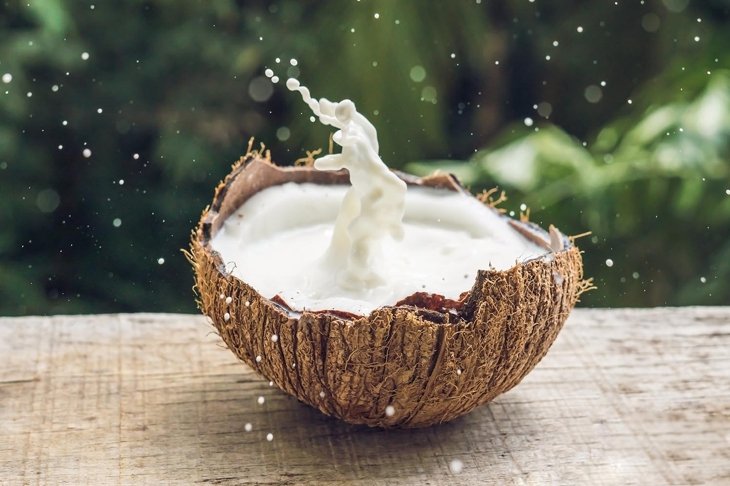 Often sold in cans, coconut milk is a superb source of manganese, an antioxidant that can help soothe symptoms of PMS and help maintain bone health. The rich liquid also contains impressive amounts of other crucial minerals such as magnesium, phosphorus, and iron. Iron is a key player in the body’s energy game: a lack of iron can lead to fatigue, weakness, problems concentrating, and headaches.
Often sold in cans, coconut milk is a superb source of manganese, an antioxidant that can help soothe symptoms of PMS and help maintain bone health. The rich liquid also contains impressive amounts of other crucial minerals such as magnesium, phosphorus, and iron. Iron is a key player in the body’s energy game: a lack of iron can lead to fatigue, weakness, problems concentrating, and headaches.
Don’t let its mild appearance fool you—coconut milk is a powerful immune booster. The lauric acid contained in both coconut milk and coconut oil has been studied as a strong antibacterial agent, with the potential to banish harmful bacteria that commonly causes skin and respiratory infections.
Although it is nutrient-dense, coconut milk is still high in calories and should be consumed in moderation, similar to recommendations for other nutritive, high-fat foods such as nuts.
No matter how you crack it, coconuts have a wealth of health benefits to offer.
05
Coconut decoded
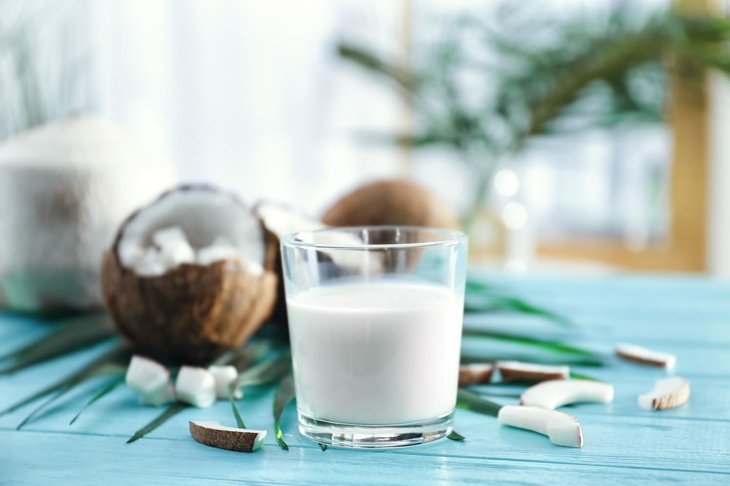 Coconut lingo can get a little confusing. Here’s a basic guide to what’s what in the world of coconut products.
Coconut lingo can get a little confusing. Here’s a basic guide to what’s what in the world of coconut products.
Coconut oil
Extracted from the kernel and the meat of the coconut. The method of extraction varies across different grades of oil.
It’s important to choose virgin coconut oil, meaning that the oil is unrefined and has been extracted from fresh coconut meat, without the use of artificial fillers or chemical solvents. Non-virgin coconut oil, also known as copra, is heat-extracted from dried coconut meat and often treated with many chemicals, losing much of its ability as both an antioxidant and a metabolism-stabilizer.
Coconut waterClear liquid contained within the centre of a young green coconut. Unlike other liquid coconut products, it is fat free.
Coconut milk Creamy liquid that emerges through the grating and straining of coconut meat, often achieved by mixing it with coconut water.
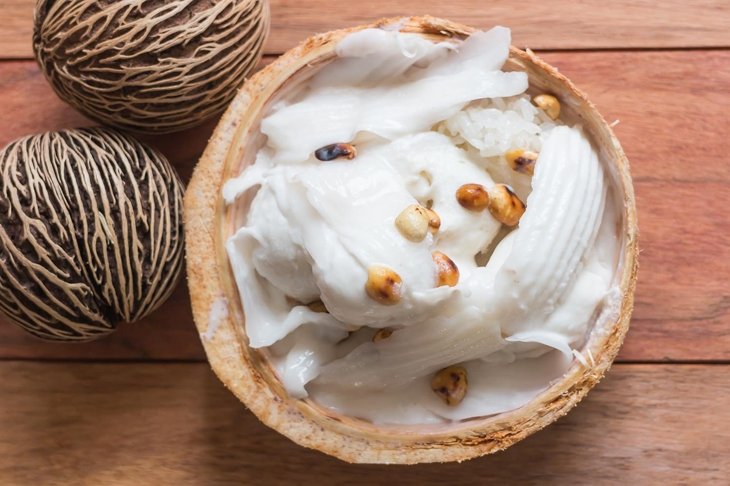
6. Coconut decoded, continued
Coconut cream
A pastelike type of coconut milk that is also composed of grated coconut flesh, but contains much less water. Some recipes call for it specifically; if you are unable to locate it, try using the congealed, thicker milk that forms at the top of unopened coconut milk cans.
Creamed coconut
The unsweetened, dehydrated meat of a mature coconut; it is much drier than coconut cream. Creamed coconut is often sold in a nearly solid block and used in curries, sauces, and baking.
Coconut meatThe edible white meat found inside a coconut. It can be eaten plain or dried, or shaved into a variety of savoury and sweet dishes.
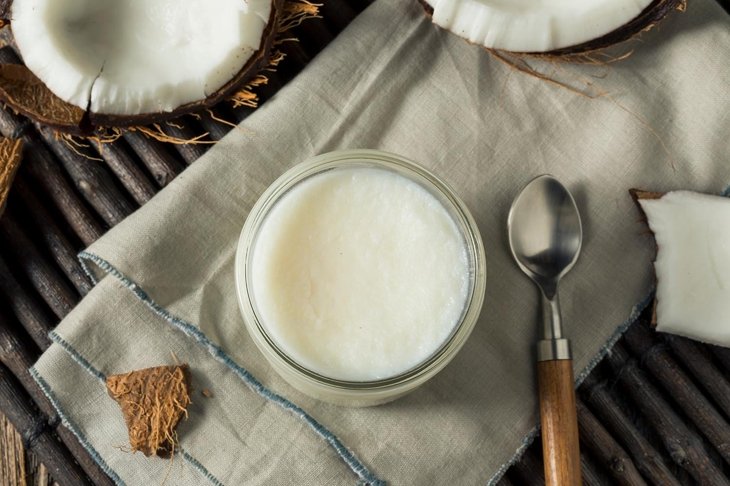
7. Use it: coconut oil
In baking, virgin coconut oil is a great substitute for less healthy alternatives such as vegetable oils and shortening. It ups the antioxidant ante and adds a faint aromatic trace of the tropics, without loading up on unhealthy fats. It’s a delicious addition to homemade granola, and it can even be spread on toast instead of butter.
With a smoke point of 350 F (180 C), coconut oil is a good option when cooking with medium heat. Swap it into vegetable stir-fries and sautés in lieu of sunflower or canola oil. Its versatility lends itself to an array of other dishes, from curries and soups to home-popped popcorn.
See “Coconut Decoded” for information on choosing the right type of coconut oil.
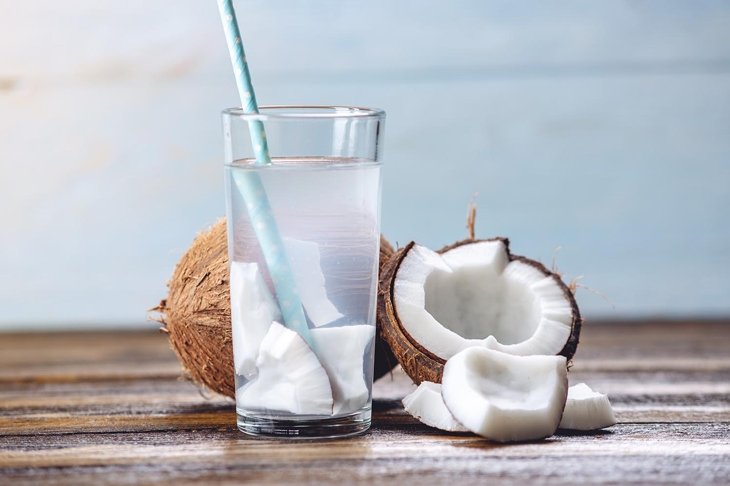
8. Use it: coconut water
Use it as a low-calorie workout beverage to hydrate and replenish crucial electrolytes such as sodium and potassium.
Keep in mind that all coconut waters are not created equal—if you aren’t draining it out of the coconut yourself, make sure to choose one with no added sugar or juices, which can quickly up the calorie count and reduce its healthy advantage over commercial sports drinks.
Coconut water also makes for a fantastic and healthy addition to fruit smoothies. Try freezing into ice cubes and tossing it into your favourite fruity drink for an instant potassium boost.
06
Use it: Coconut milk

Used in cooking everywhere from Asia to South America, coconut milk adds an exotic splash to rice dishes, seafood dishes, curries, soups, and sauces. It’s also a rich dairy-free alternative for heavy cream in puddings and other desserts.
Look for bisphenol A-free cans.
07
Conditioning with coconut oil
 The benefits of coconut oil aren’t just limited to food. Try it as a natural hair conditioner; it’s easily absorbed into the hair shaft to help repair dry, damaged hair and frayed ends. Massage a generous helping of coconut oil into damp hair, avoiding the roots if you’re prone to greasiness. Leave it in for a few hours before shampooing thoroughly to reveal stronger, smoother, shinier tresses.
The benefits of coconut oil aren’t just limited to food. Try it as a natural hair conditioner; it’s easily absorbed into the hair shaft to help repair dry, damaged hair and frayed ends. Massage a generous helping of coconut oil into damp hair, avoiding the roots if you’re prone to greasiness. Leave it in for a few hours before shampooing thoroughly to reveal stronger, smoother, shinier tresses.
It also makes a wonderful moisturizer for dry skin. Coconut oil absorbs quickly, without leaving greasy residue, and can be helpful in the treatment of some eczemas. Small skin wounds in rats have been found to heal quicker when treated with virgin coconut oil, due to its antioxidant enzyme activity.



